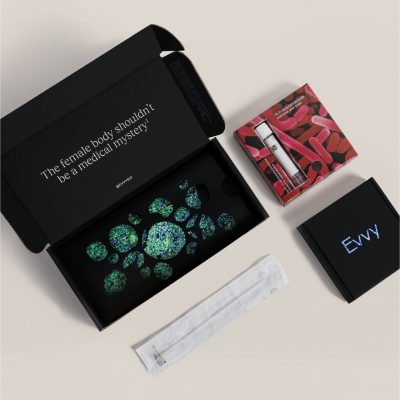[ad_1]
Another American femtech startup has joined the race to build data sets to aid research and understanding of a range of health issues that can affect women.
Evvy today released a home test kit for the vaginal microbiome. The user returns their swab to the startup for analysis – and receives detailed information and analyzes of the microbes (fungi and bacteria) that are present in their vagina and that can be linked to a variety of health problems.
Test users will also receive personalized suggestions of things to try (such as diet and lifestyle changes) to improve the balance of microbes – potentially helping with related health problems they may be suffering from , like yeast infections or BV.
Variations in the microbes present in a person's vaginal microbiome are believed to have far-reaching effects on women's health – they play a role in relatively minor infections (like thrush), but Evvy points to research that Associates imbalances in the vaginal microbiome with more serious problems such as infertility or premature birth or even links to the progression of cervical cancer.
Deciphering the vaginal microbiome is therefore seen as an opportunity to support a broad spectrum of women's health goals.
“We give users a complete understanding of everything that is there. So here are all the bacteria and fungi, and most importantly the relative amount of each of those bacteria, ”explains CEO and Co-Founder Priyanka Jain, noting that users also get their test data in a downloadable format so that they can ingest the information to their healthcare provider, if you wish.
"There are certain bacteria that play a really important role in the vagina, either positive or negative, and it makes a big difference if that is 90% of your vagina vs. 5% … For each and every microbe, which we show to a woman, we also fully explain what this microbe is, what the scientific understanding of it is today, how it could contribute to symptoms, how it behaves with other microbes that exist in your vagina – and whether that is Research has shown that it is related to any health outcome that may be important to you. ”
"We also give each woman a fully personalized plan – one that includes ways to reduce any type of troublesome bacteria, boost their protective bacteria, and maintain their overall vaginal health based on their personal life experiences," she adds. .
As with many of these femtech startups, Evvy targets the gap in women's health data. This refers to the fact that due to the historical underrepresentation of women in medical research, women may have a relatively poor experience of traditional health care, especially when seeking help or support with diseases related to female biology, well researched and understood in comparison on conditions that affect biological men.
Even relatively common diseases that can affect the vagina – such as a simple yeast infection – are frustratingly difficult to associate with individual triggers. And although over-the-counter treatments work, some women report recurring infections – and can benefit from a better understanding of why the infections occur in the first place.
The problem of less research on women's health issues also means that femtech startups have plenty of ground to cope with the tempting demands of “demystifying” the female body, as Evvy puts it. In this case, a key challenge is to clearly analyze the vaginal microbiome data it receives from users and turn it into useful recommendations for each person – without over-promising as there may be relatively little research into possible ones To underpin connections to other health conditions.
Evvy says it addresses this challenge by displaying the state of research associated with each of the personalized proposals on offer.
"I always say, treat women like they're smart," says Jain. “What we actually do with each of our recommendations is that we rate them. So they are classified as either “new”, “emerging” or “established”. And we show the women that this is the research on this type of treatment [and how relevant it might be to them personally — based on] when it has been done on people who are so similar to you that you are actually interested in the results.
“Our goal is to highlight everything that is out there. Because women … look everywhere for answers – and you see this kind of amazing crowdsourcing of knowledge, from people trying to figure out what might work for them – and our goal is to say from a scientific point of view that was all that was up to now it was studied and we are actually only transparent about how well each of these things has been researched. "
Jain says that broader research-related goals include trying to identify biomarkers with suspected links to a number of serious health problems in women – such as infertility, premature birth, STI acquisition, and cervical cancer progression.
While it is important to note that Evvy's commercial offering has a disclaimer that it does not provide medical advice – and for now only sells a "wellness" test. This is because the service is not a regulated medical device. Hence, Evvy states that it only provides "information" to customers about their vaginal microbiome (although the co-founders told us they might consider applying for FDA approval in the future).
The knowledge gap regarding women's health has led to an increase in “wellness” claims and products aimed at women – some of which unfortunately sell something like “snake oil”; i.e. selling products that lack rigorous scientific research to underpin a fuzzy range of "holistic benefits" suggested by the associated marketing (crystal healing yoni eggs, anyone?).
To be in the unregulated “Wellness” category therefore harbors risks for every femtech startup. But Evvy also sees a way to break some of the noise pollution and dubious claims by providing women with robust data on what is going on in their bodies and connecting them with real scientific expertise that can help them interpret.
According to CMO Laine Bruzek, education is an important goal of the startup.
"How can we bring science, nurses and women together in one place to get their questions answered quickly and with the best scientific information … Education is such an important goal for us because there isn't much great information available in the Internet exist, "she says.
“Not just about your vaginal microbiome – which is kind of a new and emerging space – but just vaginal health in general. There is so much misinformation, there is so much snake oil that people are selling. That's why we want to make sure we not only have the opportunity to bring the women together, but also give them access to people who push the boundaries of vaginal health research so they can get the best information when they need it. ”
Evvy's approach – which includes gynecologists and gynecological and reproductive health experts as consultants (although the founders themselves have backgrounds in data science and product design) – has attracted some high-profile investors: Today is a 5 million launch US Dollar announced led by General Catalyst, who will see Margo Georgiadis (formerly CEO of Ancestry.com) of the fund join the board.
In a statement, Georgiadis commented, “Evvy is pushing boundaries to promote women's health with more affordable and comprehensive testing, starting with its vaginal microbiome metagenomics test. The team has bold plans to enable better early detection, improved treatment and improved therapeutics with new women-specific biomarkers. "
“There is a huge opportunity to create new data sets that will change our understanding of these conditions in the female body, and I firmly believe that Evvy's unique platform, combined with the development of new therapeutics, will usher in a new era in women's health becomes. “Added Dr. Craig Cohen, professor of obstetrics, gynecology and reproductive science at UCSF and advisor to Evvy, added in a further supportive statement.
Evvy isn't the first startup to sell a vaginal microbiome home test kit aimed at women who may be suffering from conditions related to microbial imbalances, or – well – just women who are more aware of their own want to experience your own body.
Juno Bio, for example, launched a test kit for the home last year.
But Evvy uses a technique called metagenomic sequencing, which the founders say can collect more data than other commercial tests or the typical tests a woman can get through a doctor's office (with scans possibly only after some specific pathogens). So the pitch is the approach that gives a more accurate view of what is going on in a woman's vagina.
"A large part of our work consists in including what is known as metagenomic sequencing in the analysis of the vaginal microbiome," explains Jain. “When you go to the doctor's office, they can do something called a PCR test – essentially, they take a sample and look for a specific pathogen in that sample. So when you go to the doctor, you will often receive a PCR test that looks for one to three different individual pathogens.
“Since then there have been some improvements compared to other companies. Some don't use what is known as 16-S sequencing – a form of amplicon sequencing – which is definitely a big step forward over PCR, but the downside is that it can only look at certain variable regions of the genome. And you actually need to define what you are looking for in advance. So it is much more difficult to discover and you cannot find all of the bacteria and fungi that are present. Since 16-S actually cannot detect mushrooms at all, you have to test for it separately – which means that you cannot understand their relative relationships.
“So our test is really the first time someone has used metagenomics on a large scale to better understand the vaginal microbiome; for both the individual woman and the health system as a whole … Just as 16-S was an improvement over PCR, metagenomics is only an improvement over 16-S; it allows us to understand everything that is possibly present in all bacteria and fungi. ”
Per Jain, the service is the only commercially available vaginal microbiome test that can use metagenomics.
An important part of Evvy's work as a startup is then analyzing the higher dimensional data it collects – to map different microbes to potential health outcomes (based on analysis of existing research) – and understanding how individual outcomes are interpreted and provided relevant and actionable information for every user.
"Much of our work has been about data analysis," Jain confirms. “So when you do metagenomics sequencing, you get much, much more accurate data back – and we had to set it all up, we co-developed an amazing bioinformatics pipeline that is able to analyze that type of data and understand which one Bacteria and fungi they have. "Are. And then for each of these bacteria and fungi actually mapped, how are they related to the vaginal microbiome? What kind of symptoms could they cause and what health effects could they be related to?
“Most recently, we've done a lot of work with our Scientific Advisory Board to put together personalized recommendations that take into account not only the microbial data we get from the test, but also a person's medical history and symptoms and whether in which They are at the menopausal stage, or all this other information, so that we can actually make this information usable for the women. "
As soon as data from paying users starts flowing, the idea is to also support a number of Evvy's own research initiatives and partnerships (specific details on the latter are being kept under wraps for now) – all with the goal of improving health knowledge by women to expand and support what they hope to be more products in the future.
"There are so many studies that show that the vaginal microbiome is related to a premature birth, for example," says Jain. “When you look at women who give birth prematurely or prematurely, they usually have very different vaginal microbiomes than women who do not. But a lot of the sequencing that has been done in this area has used things like 16-S – and our goal is to get a much higher level of fidelity. And so we can take a closer look at the strain level of bacteria – while 16-S and other forms of sequencing can only get you down to the species level. And when we look at something as complex as premature birth, cervical cancer progression, and STI acquisition, it's not just about what's there, it's also about very, very accurate information about what strains there are. So that we can actually begin to find out which biomarkers may lead to differences between people with premature births and people without birth. "
"The other value of metagenomic sequencing is that it allows us to do functional profiling," she adds. “This helps us understand not only who is there, but what they might be doing – and all of this information put together can probably help us better understand these complex conditions that research has shown are interrelated , but no one was able to find out exactly how. "
Although the overall goal is for data from users' vaginal swab samples to aid research into a range of women's health issues, Evvy users are also paying for a commercial service to get their individual analysis – so what can they expect?
The home swab test kit costs US $ 129 for a test kit – which she ships with a personalized analysis after two weeks.
Evvy also offers a membership rate for users who want to take multiple tests – to track changes to their vaginal microbiome – and for those users the tests cost $ 99 each (with the user being able to do all three Months a test).
In launching the service in the 20 states of the United States, Evvy co-founders hope "thousands" of women will sign up to quantify their vaginal microbiome and support the broader goal of supporting female health research .
"Why is it that looking at the bacteria in the vaginal microbiome is 94% accurate to predict whether an IVF cycle will work or not?" asks Jain. “Why do women who have premature births have a different vaginal microbiome than women who do not? Or the entire cervical cancer progression, STI acquisition, pelvic inflammation.
“There are so many diseases that appear to be – either the vaginal microbiome is an interesting diagnostic possibility [or] there is even some very early research showing that women with PCOS [polycystic ovary syndrome] or endometriosis have different markers in their vaginal microbiome of women who don't have these diseases – everything from helping diagnose diseases, helping diagnosing things, to predicting the risk of so many of these diseases that we often don't notice for too long .
“Even thinking about treatment – something like IVF success or premature birth – if we are able to identify risks earlier, we can actually develop interventions that are tailored to that individual so that we can are? to avoid this negative result in the long term? "
[ad_2]
Story continues…



